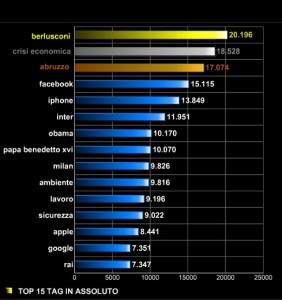Italy as seen by the Italian blogosphere
June 2nd, 2009 — Corinna di GennaroVittorio Zambardino writes today in La Repubblica about a recent research study carried out on the Italian blogosphere: what are Italian bloggers writing about? The article presents very interesting graphs, which show the top tags used in 2009 and the topics Italian bloggers write about.
Perhaps unsurprisingly, the top tag in 2009 was Silvio Berlusconi, which is followed by two current affairs related tags: the economic crisis and the Abruzzo earthquake – which are followed by Facebook in fourth place. In the top 15 most used tags we also find two football teams, Inter Milan and AC Milan, president Obama and the Pope.
Amongst the most discussed topics we find: 1) current affairs 2) soccer 3) the Internet 4) sport 5) politics. These are followed by a rather detailed list of less discussed topics from cinema, to art, to cooking, to music and so on. Finding current affairs at first place and politics at 5th place was indeed rather reassuring, supporting the idea that the Internet is indeed used as a virtual agora for discussion or a virtual civil society, rather than merely a tool for entertainment purposes. It should be noticed, however, that Maria de Filippi (TV presenter of Mediaset reality TV shows) was the top tag in the ‘entertainment category’, where we can find blogger Beppe Grillo at 4th place, and journalists Marco Travaglio and Michele Santoro further down in the list. Finally, finding the Internet as third most discussed topic, was also unsurprising – this is a common finding from research of different country/language blogospheres, where a big proportion of bloggers is made up by IT/media enthusiasts who blog about the medium they are using for communication (see for example our research on different language blogospheres from the Berkman’s Internet and Democracy project).
While the methodology used for this study is not illustrated in this article, it certainly provides a really good snapshot of what the online community and bloggers are talking about: this is very informative of what is going on in Italian society – and should be compared to the news agenda of mainstream media, in order to establish the role of the Internet in public discourse.
[Cross-posted on Corinna di Gennaro’s blog]




 Click Here
Click Here